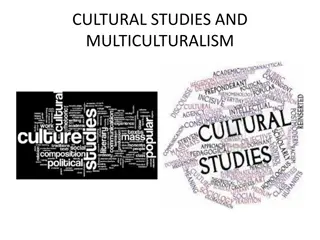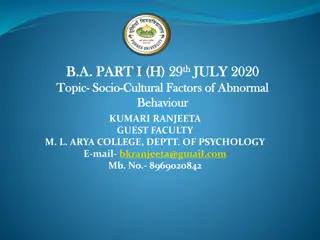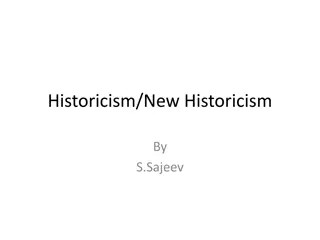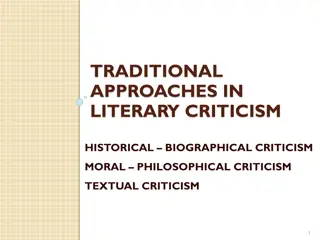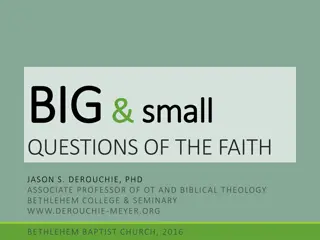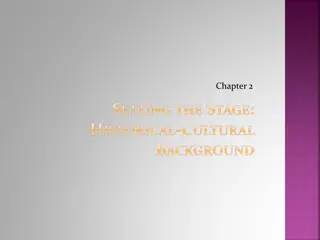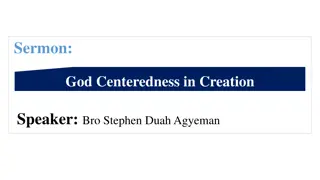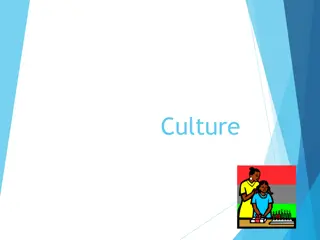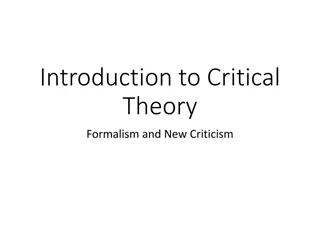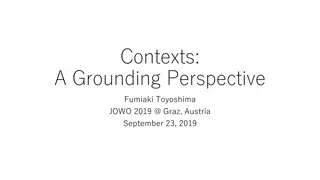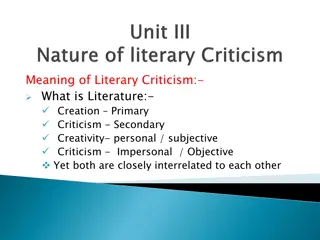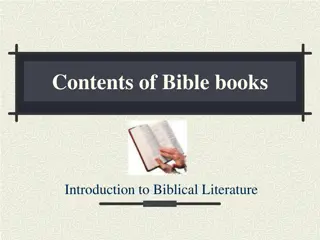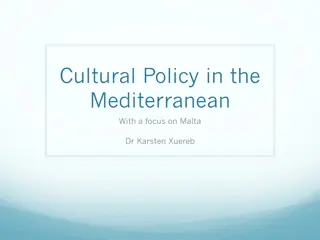Understanding Genesis 1-3: Perspectives on Historical, Literary, and Cultural Contexts
Properly understanding Genesis 1-3 requires placing it within its original historical, literary, and cultural contexts. Explore the significance of Moses addressing Israel, the literary context of Genesis within Exodus, the structural themes of Genesis, and the transition from primeval history to the story of Abraham and Israel.
Download Presentation

Please find below an Image/Link to download the presentation.
The content on the website is provided AS IS for your information and personal use only. It may not be sold, licensed, or shared on other websites without obtaining consent from the author. Download presentation by click this link. If you encounter any issues during the download, it is possible that the publisher has removed the file from their server.
E N D
Presentation Transcript
Genesis 1-3 in Context: Historical, Literary, and Cultural, Contemporary Perspectives Michael Goheen Vancouver, B.C., Canada
Thesis and structure of talk To properly understand Genesis 1-3 we must place it in its original context Historical context Literary context Cultural context Then we can draw conclusions for today
Historical context Moses addresses Israel after calling at Sinai Who is this God? What does he want with us? How can we make sense of our calling?
Literary context Exodus describes liberation from Egypt (Ex 1-18); encounter with God at Sinai (Ex 19-24) Genesis functions as prologue to give background and make sense of that narrative.
Literary structure of Genesis Genesis 2.4-11.26 5 toledoths Nations Theme: Curse of sin; Great hamartiology which reaches pinnacle in Babel society and culture twisted by human rebellion Genesis 11.27-50.24 5 toledoths Israel Theme: Promise of blessing (Gen 12:2-3 etc.) repeated throughout account
Relating Gen 2-11 and 12-50: Abraham and Israel for the sake of the world The whole primeval history . . . seems to break off in shrill dissonance, and the question . . . arises even more urgently: Is God s relationship to the nations now finally broken; is God s gracious forbearance now exhausted; has God rejected the nations in wrath forever? That is the burdensome question that no thoughtful reader of ch. 11 can avoid; indeed, one can say that our narrator intended by means of the whole plan of his primeval history to raise precisely this question and to pose it in all its severity. Only then is the reader properly prepared to take up the strangely new thing that now follows the comfortless story about the building of the tower: the election and blessing of Abraham. We stand here, therefore, at the point where primeval history and sacred history dovetail, and thus at one of the most important places in the entire Old Testament. (G. Von Rad)
Approaching Genesis 1 Genesis 1.1-2.3: Preface for whole story of Genesis While 2.4-3.24 initiates that story [of his dealings with mankind and with the fathers of Israel] . . . 1.1-2.3 sets it within its fundamental theological, cosmological, and anthropological context. . . . It supplies the fundamental view of God, humanity, and world within which alone the subsequent narrative makes sense. (J. Stek) The reason why this chapters is at the beginning of the Bible is so that all of God s subsequent actions his dealings with humankind, the history of his people, the election and the covenant may be seen against the broader canvas of his work in creation. (C. Westermann)
Approaching Genesis 1 Genesis 1.1-2.3: Preface for whole story of Genesis Two cautions: Ways modern people think of creation vs. way ancient near eastern people think of creation Human society and culture is focus vs. physical world Made known by drama or story about origin of human life vs. scientific account
Story about human life In religious cosmologies the primary focus is on describing the cosmos from the point of view of what assumptions are necessary if human beings are to live optimally in the world and so include a value judgment about what living optimally is. However, the physical and biological scientific enterprise is principally directed to describing and making models of or hypotheses about nature, and so empirical reference and feedback are its main aim; it does not place human concerns at the centre of its attention and intention. (A. Peacock)
1.1-2.3 as backdrop to Genesis God is God of all nations; creator of all peoples, the whole world; God is God unlike any of the gods of the nations; King and creation is his kingdom
God creates his kingdom Creative words portrayed as royal decrees God names day, night, sky, land, seas God assigns spheres of rule to sun and moon God s plan to create man is in royal court Humankind considered vice-regent Kingdom: God ruling over all creation including the whole breadth of human cultural and societal life. (cf. Mark 1.14-15)
1.1-2.3 as backdrop to Genesis God is God of all nations; creator of all peoples, the whole world; God is God unlike any of the gods of the nations; King and creation is his kingdom Focus is creation of human beings to develop society/culture/community that images God (1.26-28)
Creation and human society To the ancients, human society organized in a particular place was the emergent. To moderns, on the other hand, creation issues in the physical world, typically the planet fixed in the solar system. Community and culture do not come into consideration. If life is discussed in connection with creation, it is usually life in the most primitive biological sense. (R. Clifford) The natural world, the realm of human conduct, and the organizational structures of society, were all believed to lie within this one sustaining order of wisdom that had been laid down at the creation of the universe. (R. Clements)
Human culture, creation order, wisdom Ancient near east would see all of human society and culture as part of creation . . . underlying all human cultural activity is a substrate of created reality which both makes possible that activity and sets normative standards for it. (A. Wolters) To conform to those normative standards for economics, politics, etc. is wisdom . . . wisdom . . . was wrought into the constitution of the universe and human wisdom is ethical conformity to God s creation. (J. Fleming)
Creation as home for humankind World created as habitable for humanity to live in . . . the world becomes habitable for human beings; man, male and female, stands for society in nuce. (R. Clifford)
Literary Structure of Genesis 1 Stage One In the beginning God created the heaven and the earth. The earth was dark, formless, and empty
Very Good Cosmos Stage Two: Gen. 1.3-2.3 Darkness banished by creation of light (day 1) Formlessness removed by creation of sky, dry land and seas (days 2-3) Emptiness remedied by creation of creatures to dwell in four areas (days 4-6) Accomplished by commands of God Powerful word Good word Wise word Then humanity created as climax
Literary Structure of Genesis 1 Stage Two: Gen. 1:3-2:3 Forming Filling Commands Day Creation Commands Day Creation 1 (v. 3) Light 1 5 (v. 14) 4 Sun, moon, stars 2 (v. 6) Sky 2 6 (v. 20) 5 Birds & fish 3 (v. 9) Land & seas 3 7 (v. 24) Animals 6 4 (v. 11) Vegetation 8 (v. 26) Humankind 7 God rested
Genesis 1 and book of Genesis Genesis 1: World way God intended it to be Genesis 2-11: World as humankind/nations corrupted it Genesis 12-50: Way God intends to fix it through community
How did God intend world to be? World Creation of God Very good Ordered by God s word Climax: Humanity at centre as vice-regents to rule and develop world into society and culture reflecting God s image Humankind Created to know/enjoy/respond to glorious Creator God As they care for, discover, and develop creation as stewards In community Develop society, culture All for the revelation of God s glory
Cultural context Moses concerns were exclusively religious. His intent was to proclaim knowledge of the true God as he manifested himself in his creative works, to proclaim a right understanding of humankind, the world, and history that knowledge of the true God entails and to proclaim the truth concerning these matters in the face of the false religious notions dominant throughout the world of his day. (John Stek)
Genesis 1: Challenge to or polemic against pagan stories
Genesis One Pagan myths God gods vs. humanity humanity vs. world world vs.
Creation as kingdom of God God world King realm subjects vice-regents decrees creatures humanity word
Genesis 1: Challenge to or polemic against pagan stories Teaching about God, human beings, world, history To be sure, the function of Genesis 1 is not exclusively polemic . . . But an attentive reading of the whole against the background of the several myths of the ancient Near East discloses a view of God, humanity, and the world that, whatever its more or less incidental affinities with conceptions abroad in Israel s environment, stands in striking opposition to almost all that those religions had in common. (Stek)
Rich teaching of Genesis 1 Genesis 1: doctrine in narrative mode . . .that is both consistent with all the accounts of creation in the ancient world and appropriate to the function of Genesis 1 as prologue to a narrative of God s engagements in human history. All the myths of creation which may have been known by the author were, in fact doctrine in the form of stories (Stek) Whoever expounds Gen., ch. 1, must understand one thing: this chapter is . . . doctrine. It is so rich in meaning that it cannot be easily over-interpreted theologically. (Von Rad)
Conclusions for today Genesis 12-50 tells the first part of a story that will continue throughout the rest of the Bible and finds its centre in Jesus in which God acts to restore his creation. Genesis 1 teaches much about God, human life, world
Conclusions for today Genesis 12-50 tells the first part of a story that will continue throughout the rest of the Bible and finds its centre in Jesus in which God acts to restore his creation. Genesis 1 teaches us much about God, human life, world Genesis 1 (and 2) shows us God s original intention for his creation. A weak doctrine of creation subverts Christian life Creation meant to be a good home for human beings Human culture and society is central to God s creational purpose Creation is good when human beings conform themselves to God s word/order or live under decree of King in all aspects of their communal lives (wisdom) Creation includes human society, institutions, culture, etc. and not just non-human creation.
Conclusions for today Genesis tells the first part of a story in which God acts to restore his creation. Genesis 1 teaches much about God, humanity and the world Genesis 1 (and 2) shows us God s original intention for his creation. Genesis 3-11 shows us how human rebellion has polluted, twisted, distorted, corrupted God s world especially human society and culture. Often minimize gravity, scope, and power of human sin Scope: idolatry; Rom 1.18ff.
Corporate idolatry Basic sin of idolatry . . . all sin is an expression of the basic sin of idolatry, of putting something else in the place of God. (Paul Marshall) Pauline analysis of Roman culture (Romans 1.18-32) Worshiped and served created things : Communal and cultural pursuit of idolatry God gave them over : God gives over culture to its idolatry
Conclusions for today Genesis tells the first part of a story in which God acts to restore his creation. Genesis 1 teaches us much about God, human life, world Genesis 1 (and 2) shows us God s original intention for his creation. Genesis 3-11 shows us how human rebellion has polluted, twisted, distorted, corrupted God s world especially human society and culture. God chooses a community to embody his original intention for the sake of the nations. To embody God s original intention for human life Across the spectrum of human culture/society


![❤[PDF]⚡ Escaping from Eden: Does Genesis Teach that the Human Race was Created](/thumb/21697/pdf-escaping-from-eden-does-genesis-teach-that-the-human-race-was-created.jpg)

